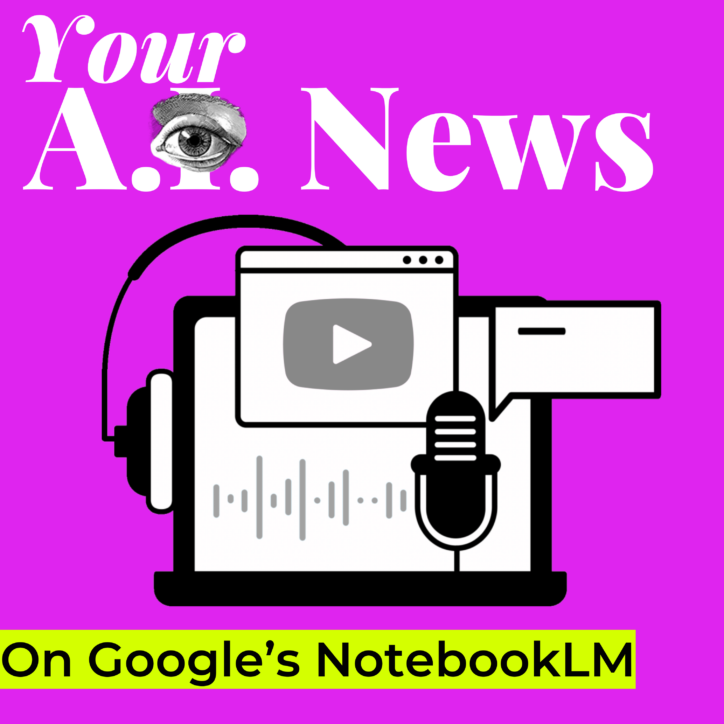NotebookLM: Google’s Free A.I. Research Assistant Turns Your Documents Into Podcasts

With the self-proclaimed copy, “The ultimate tool for understanding the information that matters most to you,” Google’s free-to-use NotebookLM is a game-changer, unlocking more ways to easily create and engage with content, whether for edutainment, research, or learning.
Built with Google’s flagship Gemini 1.5 A.I. model, NotebookLM enables users to create a personalized A.I. assistant to surface insights. One of its creators, Steven Johnson, explains, “Think of it as your virtual note-taking and research assistant.”
These personalized A.I. assistants manifest on NotebookLM through individual notebooks dedicated to a topic or project, uploading up to 50 “sources” with up to 25 million words — all from things like PDFs, Google Docs, websites, and YouTube videos. These aren’t too different from customized A.I. chatbots like OpenAI’s custom GPTs, allowing users to ask questions about the content or ask NotebookLM to format it in a specific way.
NotebookLM has been available since 2023, but it started really catching the attention of A.I. power users and influencers last month, though, after Google added a feature it calls “Audio Overviews.” Taking the internet by storm, these overviews turn your content into a podcast-style conversation between two A.I.-generated hosts about any topic you choose, providing audio “deep dives” based entirely on the documents and other sources provided. With a new update, users can now “guide” the conversation more rather than simply pulling the genAI slot machine with the tool’s output.
Interest in the tool skyrocketed; according to web data, NotebookLM sees more than four million monthly users. Online, users are sharing their useful and more off-beat experiments, such as a viral audio overview where the A.I. hosts learn that they are not, in fact, human.
What Is NotebookLM?
To give a better idea of where NotebookLM really shines, Creativity Squared generated an audio overview of our recently-featured blog post, “Understanding ‘Ripple’ by The Grateful Dead” by Jason Schneider, who joined us on Creativity Squared Episode 23 to discuss art, A.I., and immortality. His new essay compares his exhaustive human analysis of the multi-layered Grateful Dead transcendent song against an analysis by ChatGPT.
To produce the Audio Overview below, we fed a short bio for Jason along with his essay into NotebookLM and customized the audio overview’s instructions to focus its discussion on the substance of Jason’s piece. Here is the result, a highly abridged synopsis of Jason’s comparative analysis, as discussed between two A.I.-generated hosts:
Running on Google’s latest generation A.I. model, Gemini 1.5 Pro, NotebookLM is a free (for now) A.I.-powered research workspace and assistant that’s designed to become a helpful expert on whatever information it’s given.
Using any kind of Google account to register, NotebookLM users can create up to 100 separate notebooks, or workspaces, where they can upload and work with up to 50 sources at a time, including documents, audio, web links, YouTube videos, and presentations. NotebookLM doesn’t support image files directly, but if you convert images of documents to .pdf format, Gemini’s computer vision capability can read and summarize the pictured text. Each source can contain up to 500,000 words or 200MB in any of almost 70 supported languages. NotebookLM instantly summarizes each source and suggests topics for further exploration. As of NotebookLM’s October update, users are able to choose which sources are included in an audio overview.
In the NotebookLM chat box, users can ask questions about their sources and save the responses as notes that can be referenced in later chats, enabling anyone to build a rich collection of interconnected ideas and insights. The interface offers a handful of templates for synthesizing and exporting information, such as briefing docs, timelines, and study guides.
NotebookLM’s features are perfect for streamlining study sessions and research projects, but its potential goes far beyond helping people research faster. Audio Overviews have already become a popular way to spread complex ideas to audiences that may not have comprehended the same information in its original format.
For instance, one user on X used NotebookLM to turn an essay about the nature of time, written by the mathematician and computer scientist Stephen Wolfram, into an easy-to-understand audio overview.
What Makes Google’s NotebookLM Different from Chatbots?
Popular chatbots like OpenAI’s ChatGPT, Anthropic’s Claude, and their competitors all offer a similar experience as NotebookLM. At the free level, LLM users can upload documents as context and chat with the A.I. model (usually an older generation model) to ask questions. Premium ChatGPT users can create a “Custom GPT” research assistant, or a premium Claude user can create a similar kind of “Project.” Both platforms’ workspaces let users set up a custom knowledge base and unique instructions.
Right off the bat, NotebookLM’s best advantage is that users get access to Google’s top-tier A.I. model for free. Even though Google removed the experimental label from NotebookLM, the company still isn’t charging for access. For now, anyone with a Google account can access NotebookLM, though the company said it would be updating pricing later this year. In the October update, Google announced it’s also launching a pilot program for NotebookLM Business. Businesses must apply and, if approved, get early access to new features, training, and email support.
The fact that NotebookLM is still in its early days could be seen as a downside as well, compared to the scope of what foundation large language models (LLMs) like ChatGPT can accomplish. While multimodal foundation chatbots can assume a wide variety of roles to serve an even wider variety of tasks, NotebookLM is more of a purpose-built tool. For instance, NotebookLM is optimized for text inference and, therefore, does not perform well on math tasks. It also doesn’t offer an image generator or natural voice responses. While audio overviews are a powerful addition, made more powerful with customizable instructions, overviews are still limited to only two hosts with preset voices that can’t be customized.
NotebookLM offers a chat feature but only allows text input, and responses are generated based entirely on the sources that the user provides. The hyperfocus on the provided context is critical for ensuring that NotebookLM’s responses are free from hallucination, making it a trustworthy assistant when accuracy is paramount. However, the chat may fall short for projects requiring creativity or knowledge beyond what the user is aware of.
Only being able to work with the information that it’s provided means that NotebookLM can also focus its responses better than the boilerplate output that’s common from general-purpose large language models. For instance, one user shared how an audio overview based on a collection of her diary entries provided her with insights about her life from a third-person perspective, the kind of constructive criticism that other humans are usually too uncomfortable to talk about.
While ChatGPT can respond to prompts in natural language, essentially allowing users to converse with A.I., the voice options available on ChatGPT lack the same kind of easygoing, dynamic “podcast vibe.” As a result, NotebookLM has inspired a trend of “A.I.-hosted podcast” content marketing.
In the clip below, for example, a video marketing coaching channel on YouTube used NotebookLM to generate an audio overview about NotebookLM’s features and published the audio as a standalone piece of content on the channel.
Across disciplines, creatives are using NotebookLM to promote other types of content. The clip below explains how authors can upload their books to a notebook and instantly generate a podcast that they can use as marketing content across their channels.
Conclusion
Google’s NotebookLM is a big leap forward in A.I.-assisted research and content creation. By combining the power of Google’s Gemini 1.5 Pro model with an intuitive workspace for managing and analyzing information, NotebookLM offers a unique set of capabilities that sets it apart from general-purpose chatbots.
As NotebookLM continues to develop, we expect to see its impact grow in how we process new and complex information. Its ability to transform even the most dense research papers into accessible, engaging audio content opens up new possibilities for knowledge dissemination and learning.
While it’s not without limitations – such as its focus on text inference and lack of general knowledge – NotebookLM’s specialized nature makes it a powerful addition to any researcher’s or content creator’s toolkit. As A.I. tools continue to evolve, NotebookLM stands out as a prime example of how targeted A.I. applications can enhance human creativity and productivity.

“Absolutely phenomenal work! The way you’ve broken down this complex topic while maintaining depth is impressive. Your expertise and research quality are evident throughout.”
Comment by temp mail — November 12, 2024 @ 2:57 pm
Daily scoper Hi there to all, for the reason that I am genuinely keen of reading this website’s post to be updated on a regular basis. It carries pleasant stuff.
Comment by Daily scoper — February 7, 2026 @ 4:17 am